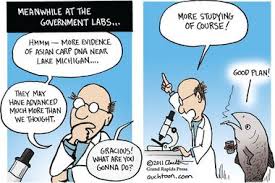Photo credit: science.kqed.org
Army Corps of Engineers criticized at meeting
for slow pace on carp issue
BY TOM HENRY, BLADE STAFF WRITER
CLEVELAND
— U.S. Rep. Marcy Kaptur (D., Toledo) got a round of applause on Thursday when
she criticized the U.S. Army Corps of Engineers for the time it took reporting
to Congress the most viable ways to fend off Asian carp from the Great Lakes.
“I wish I could say the U.S. Army Corps of Engineers understands
the importance and urgency of the situation, but — alas — that does not seem to
be the case,” said Miss Kaptur, the ranking Democrat on the House Energy and
Water Committee that oversees the Corps’ budget.
“Indeed, the Corps of Engineers was negligent in addressing this
issue. It took a bill in Congress to wake up the Corps from its hibernation.
The Corps has done this region a disservice in failing to make a firm
recommendation about the best course of action to prevent an Asian carp
invasion. When the going got tough, the Corps — for whatever reason — punted,”
she said at a public meeting inside the Cleveland Public Library auditorium.
The meeting drew about 125 people. Those who attended — a
combination of fishermen, businessmen, and public officials — fought rush-hour
traffic and icy roads to get there.
Miss Kaptur and several other members of the Great Lakes
congressional delegation have said they favor a complete hydrologic separation
of the Great Lakes and Mississippi River watersheds by rerouting the Chicago
Area Waterway System that connects them.
But they anticipate an uphill fight in Congress because the Corps
stated in its long-awaited report that option would cost $18.4 billion and take
25 years. If approved, it would be one of North America’s largest engineering
projects.
At stake is the Great Lakes region’s fishery, valued at $7 billion
a year.
The project is pitched as more than one option to fend off Asian
carp and other invasive species.
In Chicago, it is being touted as a major investment to reduce
flooding and pollution threats that have existed for decades.
“We have to build a movement to save our Great Lakes,” Miss Kaptur
said. “We have to do the opposite of what the Corps did.”
Corps officials running the meeting did not respond as she spoke,
although they later said they understand a lot of Great Lakes residents are
frustrated by the Asian carp situation and want faster action.
The Corps announced at the outset of Thursday’s meeting it has
slated meetings in Erie, Pa., for Jan. 24 and New Orleans for Jan. 31 because
of strong interest in those areas. New Orleans wants to weigh in because of the
possible effect the project could have on the Mississippi River and the
shipping industry.
The next meeting is Tuesday in Ann Arbor. All meetings are from 4
to 7 p.m.
One of the first speakers Thursday was Ohio Attorney General Mike
DeWine, who said he arrived “with a great deal of frustration” because of
delays and because of litigation that Ohio, Michigan, New York, Minnesota, and
Wisconsin initiated against the federal government and the state of Illinois
over the matter. Illinois has resisted calls to temporarily close the
Chicago-area locks, citing the need to save jobs.
“Some of us feel nothing is going to work except a complete
separation. We do not want to be in a position someday where there is no more
sport-fishing,” Mr. DeWine, a Republican and a former U.S. senator from Ohio,
said.
As he left the meeting, Mr. DeWine told The Blade he remains in
favor of a complete separation, despite its costs and length of time it would
take.
The Corps said during most of that 25-year construction period,
new reservoirs and tunnels in the Chicago area would be built to prevent
flooding and improve water quality.
Mr. DeWine also implored the White House to pick up the pace.
“Now that this study’s finally done, it’s time to do something.
Let’s not take another six months,” Mr. DeWine said. “It’s going to be
expensive, but it’s going to be more expensive if we don’t [do a complete
separation].”
Several Cleveland-area fishermen and property owners testified in
favor of a hydrologic separation.
Sam Speck, a Republican who served eight years as Ohio Department
of Natural Resources director under former Gov. Bob Taft, said the $18.4
billion price tag is not as enormous as it sounds, given that it could be
phased in over 25 years.
“From everything I have seen to date, the most comprehensive
approach is the one we need to take,”Mr. Speck said.
Larry Fletcher, Ottawa County Visitors Bureau director, said
Ohio’s tourism and economy is supported in large part by the fishing industry.
But Mr. Fletcher said the state’s booming birding industry also
would take a big hit if the fishing industry collapses because of the
ecological connections between birds and fish. Lake Erie, he said, has become
one of the world’s Top 10 birding destinations.
Kristy Meyer, Ohio Environmental Council managing director of
agricultural and clean water programs, said nearly a third of Ohio’s $40
million tourism industry is supported by the state’s eight Great Lakes
counties.
“We need to move quickly. We need to move with interim steps [to
fend off Asian carp] that will put a complete separation in place,” Ms. Meyer
said.
U.S. Sen. Sherrod Brown, a Democrat, and U.S. Sen. Rob Portman, a
Republican, did not attend the meeting. A staffer for Mr. Brown delivered a
statement in which he reiterated the senator’s support for a separation of the
watersheds.
So where does Sen. Portman stand? He led the charge to get action from . . . the Army Corps. of Engineers. Here's part of a news release on his website from last November:
Portman, Stabenow Lead Senate Effort to Stop Asian Carp
Call on the Army Corps of
Engineers to Identify Remaining Steps Needed to Permanently Cut Off Asian Carp
Entry Points into the Great Lakes
Washington, D.C. – Today, a
bipartisan group of all 16 Great Lake Senators, led by U.S. Senators Rob
Portman (R-Ohio) and Debbie Stabenow (D-Michigan), joined in an ongoing effort
in the fight to stop Asian carp from destroying the Great Lakes ecosystem. In a
letter to the U.S. Army Corps of Engineers, the bipartisan group of Senators
called on the Corps to identify remaining steps needed to permanently cut off
Asian carp entry points into the Great Lakes.
Last year, the Stop Invasive Species Act,
written by Portman and Stabenow, was signed into law by President Obama.
The law requires the Army Corps of Engineers to present Congress, by the end of
the year, with a report (known as the GLMRIS report) on possible strategies to
permanently prevent Asian carp from entering the Great Lakes. Today’s
bipartisan action urges the Corps to outline the steps it will take once that
report is submitted to determine the best approach among the possible options
so work can begin as soon as possible.
The Great Lakes
Senators’ letter reads in part: “It is our expectation that the Corps
will work with Congress, our staff, and regional stakeholders before and after
the report is issued so that we can expeditiously determine how to best move
forward with a comprehensive approach to address Asian Carp and other aquatic
invasive species. We ask you to identify how you intend to work with
stakeholders on a comprehensive alternative that will maintain commerce,
enhance and not degrade water quality, and permanently safeguard the Great
Lakes from Asian carp and other invasive species following the release of the
GLMRIS report.… Upon release of the GLMRIS report, it is imperative that the
Corps continue its evaluation process under existing authority so that we can
move very quickly on a comprehensive approach to best protect the environmental
and economic health of the Great Lakes and Mississippi River.”

photo credit: mlive.com










